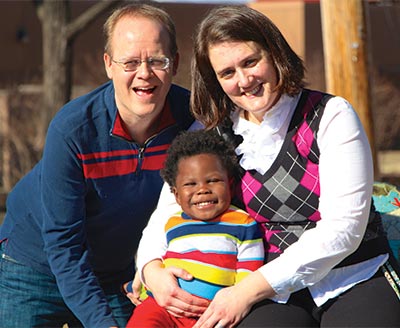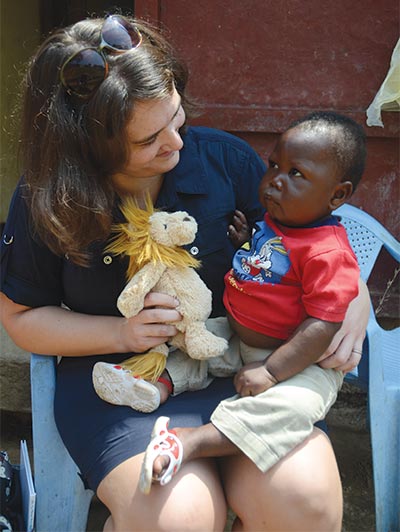
BY TOMPAUL WHEELER
We can’t guarantee we’ll be able to issue a visa for your son to leave the country.”
My wife, Lisa, and I sat in the U.S. consulate in the Democratic Republic of the Congo, our 13-month-old son snug in a carrier on Lisa’s chest. It was our second morning in the capital city of Kinshasa, and not yet 24 hours since we had picked him up from his orphanage.
Legally he had been our son for more than four months. But the closer we got to taking him home, the weirder things became.
Growing up with an adopted older sister, I had anticipated adopting for as long as I could remember. With a heart for the most vulnerable, Lisa felt the same. “Motherhood goes far beyond genetics,” she told me. “I really feel that adoption celebrates the way God loves us.”
A few years ago we had found ourselves the part-time parents of a teenage girl who needed support. The experience assured us that we had what it took to be adoptive parents. In late 2010 we settled on an agency working in Ethiopia, and we decided to adopt a boy.
 ALL SMILES: Families are laboratories where the principles of heaven are demonstrated." style="float: right;">
ALL SMILES: Families are laboratories where the principles of heaven are demonstrated." style="float: right;">
But we hesitated. Word came that Ethiopia was slowing down its adoption processing. The summer of 2011 we prayed and pondered. Finally we decided to stick with our agency and move ahead. “Unless we get a sign from the Lord,” I told their rep, “we’re committed to your program.”
The next Tuesday morning my phone rang—the agency rep again, apologetic. Their program was on hold. Inwardly, I thanked God that we hadn’t mailed our dossier, and the US$4,000 down payment we would have lost with it.
When I called to give Lisa the news, I asked, “Should I call that Congo agency again?”
A year earlier, I had contacted an agency working in the Democratic Republic of the Congo, a central African nation scarred by civil war and grinding poverty. “Our program’s too new,” they had said, “but we’ll put you on a waiting list.” So now I called again. The program director answered, and sounded quite surprised to hear from me. Their first families had just brought children home, and, as of that morning, they were accepting new applicants.
We soon learned of a baby boy, just 4 months old. Political unrest delayed his medical testing, but after six weeks an unflattering photo of an annoyed baby arrived. His name: Senghor (Sen-gore). Searching online, I discovered that Senghor was the surname of the first indigenous president of Senegal, a renowned poet.
We fell in love with the name, and the somber, chubby-cheeked boy who stared out at us from a second picture. In January 2012 we officially matched, and as the months went by we waited for news, for documents translated from French, and for any new photos of our soon-to-be son. That May we officially became his parents, but the immigration process dragged on.
“Are you sure that’s Senghor?”
Lisa and I stared at new images from the Congo. In them Senghor’s skin sagged. His hair and eyebrows were gone. His hollow eyes focused on nothing. We barely recognized him. He had always looked serious, but now he just looked numb. We soon learned that a doctor had declared him “too fat,” so the orphanage staff had cut back his meals. At 10 months of age he had lost three pounds. Our adoption agency intervened, but the photos still chilled us.
I researched our looming trip to Kinshasa. An adoptive family shared on their blog what they had encountered picking up their daughter, including video of her orphanage. As they arrived, the first child they encountered was a baby boy, who stared off into space as they greeted him: Senghor.
A few weeks later I found another video. Again a parent’s roving camera found Senghor sitting by himself. “Hi!” the adults greeted. Senghor looked up, but his eyes made no connection.
I sat at our computer and cried. Was our son OK? Had sudden starvation made him worse? We had no way to know. Whatever the truth, he was our son—and he needed us. And we needed him.
After strenuous and sustained prayer, Lisa and I made up our minds. We would fly to Kinshasa the first week of September. We didn’t know when we could bring Senghor home, but we felt we had to get him out of the orphanage and start parenting him.
 NICE TO MEET YOU: Lisa Wheeler meets her new son for the first time." style="float: left;">
NICE TO MEET YOU: Lisa Wheeler meets her new son for the first time." style="float: left;">
We bought plane tickets, then got a call from our agency. The good news was that his visa was in process. The bad news was that the consulate had launched an investigation into his background, which could take several months. The agency discouraged us from traveling. “They won’t move any faster just because you’re there,” the director told me.
But our minds were set. Our boy needed us. We signed a waiver holding our agency blameless for any complications, put our trust in God, and set flight for Africa.
Tuesday, September 4: Our first morning in Kinshasa. Our guide’s wide smile greeted us in the hotel lobby. And his question sounded so . . . real.
“You are Senghor’s parents?”
“Yes!” we answered. Lisa and I climbed into an SUV and headed from Kinshasa’s hectic center to the green hills of Senghor’s orphanage. As we arrived, workers were delivering the last of several new cribs and beds.
A woman appeared in a doorway. In her arms a sleepy baby, blinking. It was Senghor. Our son. He was real. “Lisa!” I breathed. She turned, inhaled, and reached out for him.
His belly was as round as a basketball. His face, which seemed all cheeks, nearly swallowed up his tiny nose. Patches of hair had begun to grow back on his head, but some were an unnatural red color. His chest rattled with a sound I had to keep reminding myself was not a contented purr.
He looked about ready to cry, but he just didn’t have it in him.
We handed him a toy lion. He just stared at us. Lisa hugged him tight. “Oh, I’m never going to let you go!”
Senghor fell back asleep in the morning sunshine. We took him to the SUV, back to Kinshasa, on to his new life. As we bounced along the pitted roads, Senghor’s head slammed hard against the window. He didn’t make a sound.
That afternoon we bathed him, hugged him, and took a hundred pictures. He was so quiet, so serious, so small. He just stared at a toy rattle.
Wednesday morning we entered the tiny room where the consul and vice-consul looked out at us through glass. The consul spoke with his jaw tight, his words controlled. “We wanted to let you know that we’ve found out some things about your case . . . The documents said he had no parents, but he does have parents . . . We need to interview those parents, and the social worker, and . . . The worst-case scenario is that you may not be able to take your son home . . . You have to make a plan for staying here long-term.”
We stepped out of the room shell-shocked. Senghor would need revised documents, paperwork that had taken months the first time. The consul’s words that we might not be able to take Senghor home, though, rang the loudest. We prayed, called our families, and settled in to wait.
Meanwhile the faint outline of a half smile squiggled onto our son’s face. “Almost a smile,” I encouraged, dancing him around the room in my arms. “Almost a smile.”
By Wednesday dinner, he had absorbed some 30 hours of nonstop love, attention, and affection. And when he discovered a love for curry and palak paneer, Senghor beamed and laughed with abandon. He had transformed from supremely solemn to seriously silly. Having just started crawling a week before, Senghor started walking, with assistance from us or from the nearest piece of furniture.
As the days passed, the visa situation remained murky. The adoption agency’s local lawyer couldn’t fathom why the technical detail of Senghor’s parents’ identities was such a big deal. But as I lay in bed Friday night aching with food poisoning from a bad lunch, Senghor’s Cheshire grin beaming down at me, I thanked God for getting us that far.
We learned that Senghor’s biological mother had abandoned him when he was 3 months old. Without income, there was no way his biological father could have afforded the infant formula—itself many days’ wages—to keep Senghor healthy. His father was scheduled to speak to the consulate Monday, and would be glad to tell his story.
We passed time in our small hotel room, bonding, playing with toys, and feeding Senghor what little we could concoct with a teakettle: mashed potatoes, oatmeal, cold canned beans. He insisted on holding food in each hand as he ate, plus whatever he could cram into his mouth.
Monday afternoon we knelt, prayed, and waited for word from the consulate. Then, as we passed through the hotel, we spotted a young man drinking a Coke with our guide. Our agency had told us not to speak with Senghor’s biological father, but I felt compelled. I walked across the lawn and extended my hand. Senghor’s father held on and shook it for the next several minutes.
Looking back, there’s so much I wish I had asked, such as why they’d chosen such an uncommon name. In that moment, though, I focused on one thing: This man was the key to us bringing our son home. Our guide took our photo together—me, as exhausted-looking as I felt, my arm around his shoulders; he, handsome with fine features and Senghor’s eyes, a muscular arm clasped across my chest. Despite the ordeal, I was grateful to have details to share with my son about his background.
A week later, I finally dashed from the embassy into the rain, Senghor’s immigration visa packet tucked beneath my arm.
Today I watch Senghor throw back his head during meals, happy about so many things he can’t seem to process. I humor him with one more energetic reading of
Llama Llama Red Pajama. I soothe his “owies.” I wonder at the utter bliss that shines from his face as he puts one arm around each of us and pushes Lisa and me together so we’ll kiss, then tilts his head so we’ll each kiss him.
And I think that one day soon Senghor and Lisa and I will all bask together in another embrace, a holy, heavenly Father’s hug. We shall kiss Jesus as freely as we wish, and share the utter bliss of forever with Him. And I wonder: how much of the difference will we ever appreciate—the difference between our now and our then, our time in the orphanage and our place in our Father’s home, the dull planet we now share and the glory that then will be?
We left for Africa, uncertain when we would return, with a house that still needed plenty of preparation. Yet we’ve been assured that our heavenly Father’s place is ready for us, and that His Son will soon return to take us home. “In love he predestined us for adoption . . . through Jesus Christ, in accordance with his pleasure and will—to the praise of his glorious grace” (Eph. 1:4-6).
Tompaul Wheeler is director of the documentary Leap of Faith: The Ultimate Workout Story and author of GodSpace. He lives with Lisa and Senghor in Nashville, Tennessee.